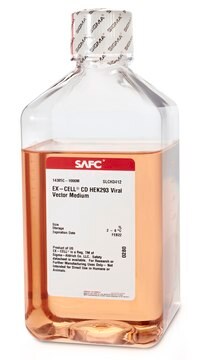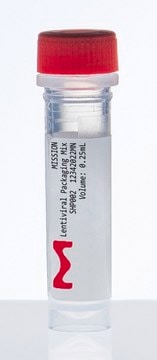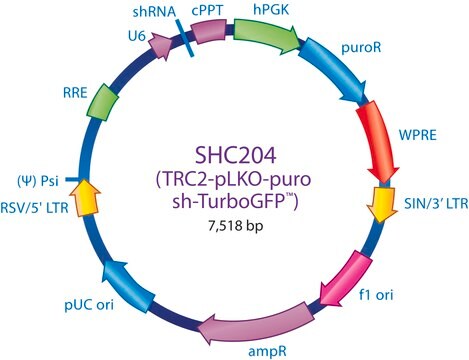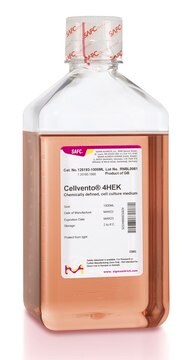VP001
VirusExpress® 293T Lentiviral Production Cells
Pharma Manufacturing
Synonym(s):
HEK293T cells for lentivirus production
About This Item
Recommended Products
General description
VirusExpress 293T Lentiviral Production Cells are derived from the HEK293T cell line (ATCC CRL-3216) through single cell cloning. The parental HEK293 cell line was established by transformation of human embryonic kidney cells with sheared human adenovirus 5 DNA (Graham FL et al. 1977). A 4-kb adenoviral genome fragment is known to have integrated into chromosome 19 and encodes for E1A/E1B proteins. HEK293T cells were created by stable transfection of the HEK293 cell line with a temperature-sensitive mutant of SV40 large T antigen. Due to the expression of the large T antigen, transfected plasmids that carry the SV40 origin of replication can replicate in 293T cells and will transiently maintain a high copy number. Our clonal derivative eliminates variability from the population while also being adapted to suspension, serum-free conditions. Suspension culture and chemically defined medium allow scalability into stirred tank bioreactors for yields that can meet commercial needs.
Packaging
Other Notes
Legal Information
recommended
related product
Storage Class Code
12 - Non Combustible Liquids
WGK
WGK 1
Flash Point(F)
Not applicable
Flash Point(C)
Not applicable
Choose from one of the most recent versions:
Certificates of Analysis (COA)
It looks like we've run into a problem, but you can still download Certificates of Analysis from our Documents section.
If you need assistance, please contact Customer Support.
Already Own This Product?
Find documentation for the products that you have recently purchased in the Document Library.
Related Content
A transfection-based solution to viral vector production using a suspension cell line, chemically defined medium, and a process with proven performance at scale.
Our team of scientists has experience in all areas of research including Life Science, Material Science, Chemical Synthesis, Chromatography, Analytical and many others.
Contact Technical Service







